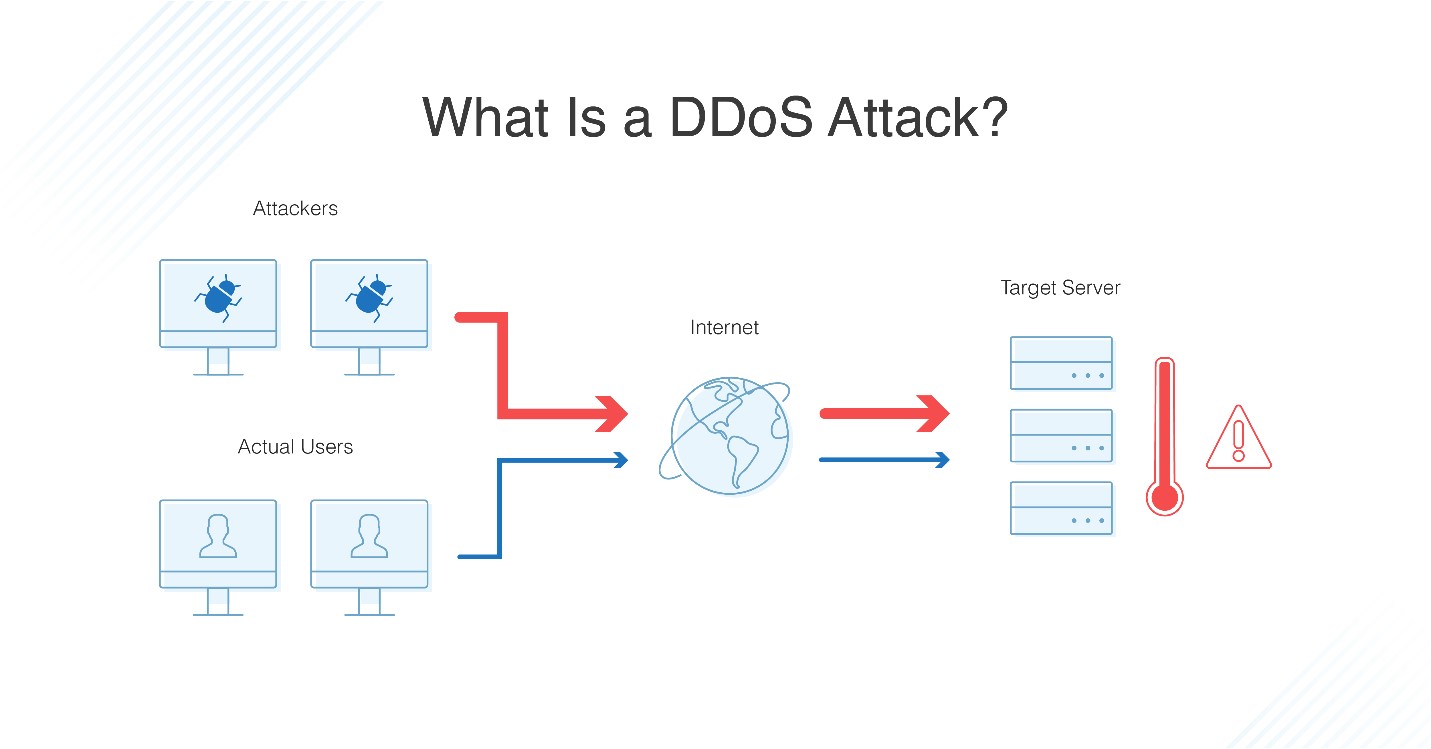The consequences of DDoS attacks are rising rapidly every day. It becomes the primary threat to most of the online assets. Not just the magnitude of the DDoS attacks, but also the growth in frequency of the overall attacks is more concerning. The pain point, you can’t deal with such sophisticated DDoS attacks with or by a single line of defense.
But, it is inevitable being online since it is easy to carry out. More successful your website is – more likely it will be the target. But, understanding the causes, effects and proper security measures, you can reduce the chances of DDoS attacks on your site.
A short intro about DDoS attacks
It stands for Distributed Denial of Services. It is nothing but the website being flooded with sudden traffic spikes at a point of time. The aim is to overload the web servers, disturb its performance and crash it. Surprisingly, your website receives good traffic during BFCM seasons; it is appreciable. But, these traffic surges are automated and come from very limited sources.
Sometimes, DDoS attacks will be followed by attempts to hack your site since your website becomes more vulnerable. But, in most of the cases, DDoS attacks are to ruin any website or make it stop working.
Should you really concern about the security lapses that leave a room for DDoS attacks?
Causes of DDoS Attacks
Why should one target your site with it?
They aren’t attempting this to gain access to your site. So, what they are trying to gain mounting DDoS attacks on you?
Here are some of the common reasons or causes for such cyber attacks.
There are several legitimate ways to outrank competitions like SEO, CRO, etc. But, sometimes, the competitors would take some severe measures to bring down your website or cut off your traffic, such as deploying DDoS attacks.
Say, if your competitor is targeting the same product or keyword, this kind of attempts will result in your site down. Especially, at times when you are running advertisements, your competitors can win the game, killing yours.
Sometimes, it may be due to its content nature. If a site has content about controversial topics like racism, it will have to suffer. It may be commercial, but, some people don’t want such sensitive things available online.
Effects of DDoS attacks
Depending on the magnitude, type, and the nature of the attack, the effects of every DDoS attack vary. Most importantly, how prepared you are against it, matters. Let’s see some of the critical effects.
Website downtime
Ideally, the website will soon be overwhelming and becomes unavailable for the user’s access. In such a case, you will lose your business credibility among the customers.
When it takes more time to fix the issues, and meanwhile, Google crawls your website and finds that it is out of order, then you will lose search engine visibility too.
Then, when your site is overloaded with traffic surges, it will return a 502 (bad gateway error) error code to the users. This will adversely impact your search engine rankings.
There are cases; the site owners wouldn’t even know that the site is under DDoS attacks. And hence, the site hasn’t been available for more number of days. Notably, when all your site links and elements vanish, and you don’t have your site backup.
Hosting server issues
The hosting providers will get you enough tools to protect your site against such security threats. Still, when you are using shared servers, and you fail to mitigate the risks, this will impact other sites on the same servers.
Similarly, when the attack is on other sites on the shared servers where your site is hosted, then you will have t face the consequences. Not to mention, your site is not at all the target; still, it will get affected.
Website vulnerability
As said above, the objective is not to access your website data or passwords. But, at times, these DDoS attacks will be followed by unexpected severe hackings.
Since you will be busy in getting your site back online, your security systems are in full-tier and engaged in mitigating the DDoS attack. When it paralyzes your site, hackers will find this is the good time to breach the security and enter into the site via backdoors.
The website hackers are always smart in executing such attacks. The following back doors attempts wouldn’t be from the same sources. They know how to hide their real location tracks and use multiple IP’s to attack your site.
So, when your site becomes the victim, make sure your website is secure.
Lost time & money
Repairing a DDoS paralyzed website takes time and indeed, more money. When you don’t have site backup or don’t know what exactly has happened to your site, you will have to rebuild your site completely. That isn’t so simple.
And, while the site is down, you will face the loss in revenue. Further, you will have to hire a security expert to bring your site back online. That’s an additional cost to you.
So, all these effects of DDoS attacks accentuate how important protecting your site against such threats. So be preventive and prepared your site for it.
What makes your website more vulnerable to these attacks ?
As we all know, WordPress is highly vulnerable due to its popularity. Indeed, WordPress has its own security options too. While this may be general, what makes some specific sites to be more vulnerable to these DDoS attacks?
Choosing cheap hosts – there may be several downsides that lead your website to such security risks. It includes a lack of support, the volume of clients, limited security measures, etc.
Lack of preparation – when you don’t have proper security measures in place and or even alerts to know that your website is under DDoS attacks.
Using Outdated versions – not keeping the site, WordPress, plug-ins, themes, PHP updated to its latest and secured versions.
How to protect your site against DDoS attacks ?
The precautionary measures depend on your setup, budget and preferences. Here are the options, in general.
Protection at your server-side
The hosting provider can offer a handful of security measures to safeguard your site. It includes
- A cloud platform that runs your website on multiple data centers virtually to balance the loads
- GEO IP blocking to detect and alert you about any DDoS attack and hence, allowing you to block the IP addresses from the particular geographical area
- Good security firewalls to reduce the chances of such attacks, however, they can’t give you total protection
Using Content Delivery Networks
Not only for the fastest content serving but also it helps to stop unwanted traffic to your site. Most popular CDN services like Cloudflare with its user-friendly dashboard allow you to monitor and understand the vulnerabilities.
Opting for professional DDoS protection services
The established security services like Sucuri are known for its fastest recovery or site cleanup services after hacks. Also, it helps you with preventive measures to avoid future attacks.
Despite all, they work well in protecting your site from these DDoS attacks and mitigations. Employ some advanced security features to monitor, prevent and protect your site before it damages your website vastly.
Final words
Hope this article about DDoS attacks would get you some idea about the causes, effects and preventive measures to fight against such cyber attacks. More the digital exposure, higher the chances for security loopholes will be.
So, have your site ever faced this kind of DDoS attacks? How do you know that your site under DDoS attack? And, what steps you have taken to bring your site back again? Share your comments below.
Author Bio :
Jenna Ronan – the blogger and outreach marketer @ HiBlogging. Aiming to render valuable tips and resources, I strive hard to upgrade myself and spread the knowledge with blogging.




